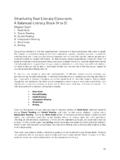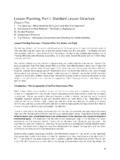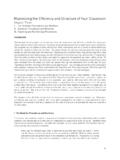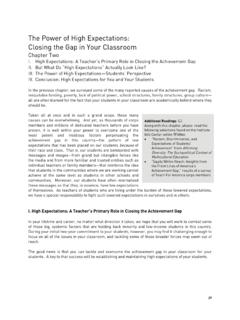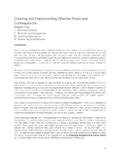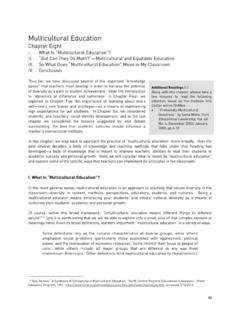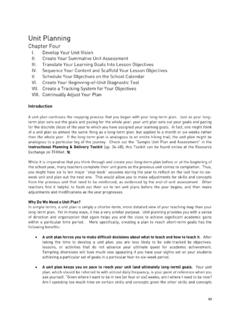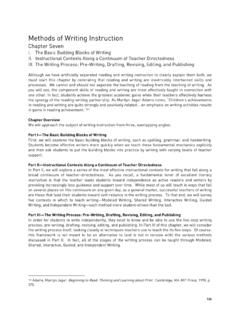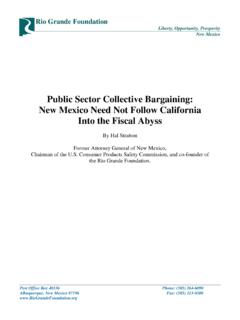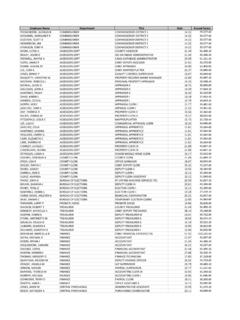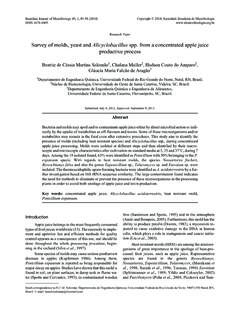Transcription of Responding to Misbehavior - Teaching As Leadership
1 Responding to Misbehavior Chapter Four I. Reflecting on the Causes of Misbehavior II. Responding to Minor Interruptions III. Implementing Consequences Effectively IV. Major Incidents Introduction The previous chapters of this text have addressed various foundational components of a classroom culture of achievement. Establishing rules, consequences, and routines encourages and supports the excellent behavior necessary to effect significant academic gains with your students. This chapter will discuss the components of your classroom management that are of a more corrective nature those methods by which you will assert your authority and apply consequences when a student does not meet your high expectations for behavior.
2 Sometimes, due to a variety of factors ranging from the teacher's lesson pacing to how a classmate goaded them in the hallway, a student will choose to break a rule and receive the consequence. Other times, the student won't act out in frustration or pain but will still disrupt their own or the class's learning for example by rhythmically tapping her pencil and humming during silent independent work, or by passing a note to her friend two rows over. In both cases, you must respond to these disruptions in order to maintain the classroom community and culture that you have worked relentlessly to build. Ultimately, you want your students to see Misbehavior as a disruption to their learning.
3 Students in Maurice Rabb's (Los Angeles '99) class responded with, Does that help us learn to read and write? when a classmate misbehaved. We will first take a careful look at factors that cause Misbehavior . If a teacher understands the roots of student interruptions and poor behavioral choices, that teacher is more likely to respond calmly and not take the Misbehavior personally. That teacher also has the emotional distance to help students understand how their behavior affects their learning and the learning of their classmates and to reflect on what steps they could take to prevent student Misbehavior in the future. With that foundation, we will discuss how to respond to student behavior that may not break a rule but still interrupts the learning environment of your classroom, along with best practices for implementing consequences when a student does choose to break a rule.
4 Finally, we will discuss particularly challenging situations that you should think through carefully before the school year begins. I. Reflecting on the Causes of Misbehavior In every case, your search for the impetus for Misbehavior should start by examining your own decisions and actions. Quite frequently, teachers discover that the plans they've created, the rules they've crafted (or failed to craft) or the comments they make to students may be the very things working against them. 43. Responding to Misbehavior Lesson planning. While this is by no means always the My number one classroom management case, incidents of disruptive or off-task behavior are often strategy was solid and tight lesson planning.
5 Tied to a weakness in our own planning and design of the I found that students who are engaged in a lesson itself. Students will become disengaged and then lesson and have specific goals they are off task - if they are sitting at their desks simply watching working toward have a lot less time to be Anthony complete the math problem on the board during distracted and get off-task. the guided practice stage of your lesson. Students who finish an independent activity and don't have anything else Lee McGoldrick, Los Angeles 93. to work on will find other things to occupy their attention. Vice President, Growth Strategy and When you plan, you should ask yourself not just, What will Development Teach For America I be doing every minute of the class?
6 But more importantly, What will my students be doing every minute of the day? In this sense, the interconnectedness of the Instructional Planning & Delivery text with the Classroom Management & Culture text cannot be overstated. As you master the art and science of lesson planning, you improve your ability to design lessons that decrease the risk of off-task behavior that often leads to disruptive behavior. For example, perhaps you want your students to practice multiplying fractions. Your first thought is to have two or three students at a time come to the chalkboard to practice those problems. Your second thought is, Well, that's not a bad idea, but what are the thirty other students going to be doing at that time?
7 Not only would having only three students at a time engaged at the board be an inefficient means of instructing thirty-plus students, but having thirty disengaged students is clearly an incubator for disruptive behavior. To head off this problem, you change your plan. You go to a home-and-garden store and purchase a large sheet of dry erase board, which can be easily cut to create miniature whiteboards for each child. You hand out dry- erase markers and paper towels, and each student completes the problem in big numbers. All the students then hold up their boards for you to see when your timer dings. With that adjustment to your lesson plan, you have greatly increased the effectiveness and efficiency of your lesson and greatly decreased the likelihood of disruptive behavior.
8 Student boredom. Boredom can arise for a number of reasons and can result in a student going to sleep or being disruptive. First, the student could be under-challenged academically. Do not discount the notion that your biggest troublemakers may actually know (or at least think they know) the material before you teach it. Second, students might not be engaged with the lesson, because they are not invested in the academic goals, because the lesson is beyond their academic abilities, or because the pacing of the lesson is too slow. The chapter on Differentiation in the Instructional Planning & Delivery text will give you specific strategies for challenging all levels of learners.
9 Also, strive to engage all students at all points in the lesson (perhaps by sprinkling students' names throughout the introduction of new material and guided practice, and by making sure all students are involved in all aspects of the lesson cycle). Of course, lesson planning alone does not guarantee that a lesson will pass without disruption. However, a poorly planned lesson does virtually guarantee off-task or disruptive behavior. After examining whether student Misbehavior could stem from your own instructional delivery, examine other potential contributors to off-task and disruptive behavior. The following are some other common teacher-created causes of Misbehavior in classrooms:15.
10 15 This section is adapted from Curwin, Richard and Allen Mendler. Discipline with Dignity. Alexandria, VA: ASCD, 1988. 44. Unclear limits. You may be shocked to hear that When I first started Teaching , my classroom was D'Andre, your third-period angel, shouts out answers an implicit heaven. I would ask, beg and plead constantly in another teacher's room (a teacher, who, with my students to do something Can you please sit down now? Will you get out your incidentally, does not think it is important to expect reading books? It wasn't working for me, and students to raise their hands to speak during a class my students got frustrated with me because I discussion).
